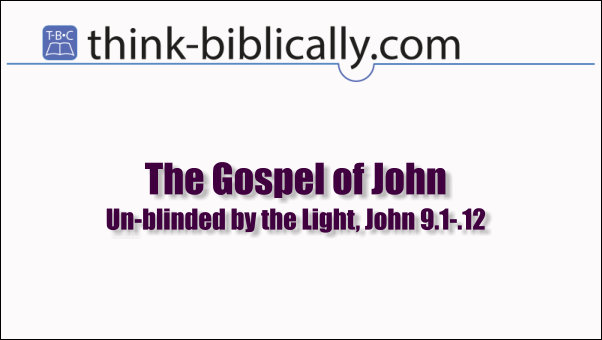By Tyson Thorne

As Christians God has entrusted us with a lot of knowledge. Unfortunately, even good people often fall into narrow perspectives. Take the disciples, for example. In chapter nine Jesus and his troop happen upon a blind man. Knowing that sometimes the sins of the father are visited upon the son, they asked Jesus (thinking themselves very holy and smart, I'm sure), "was it his father or mother whose sin caused the blindness?" A narrow perspective indeed. Jesus widens that perspective. It wasn't sin that caused the man's blindness, it was God who had great things in mind for the man.
I'm really glad this passage is in the Bible for two reasons. First, it does open our eyes to the fact that we do not know every reason for a persons suffering. I'm certain that not one of the disciples would have guessed that the blind man in this passage was blind so that God could perform a miracle that would be influential in the lives of the people of that day and billions of others across history. Second, we cannot know why everything that we think is bad or wrong or unfair happens to us. What we can do is believe that God has brought it upon us for a reason and, even if we never know the reason, we can be thankful for that suffering because we know that is some way we are known by God.
Jesus then makes an interesting statement, saying, "We must perform the deeds of the one who sent me as long as it is daytime. Night is coming when no one can work. As long as I am in the world, I am the light of the world.” It would be easy to say that Jesus was talking about his time ministrering in the flesh for in the same context he also calls himself the "light of the world". That would mean, though, that today we are in spiritual night and we would not be responsible for doing what God sent Jesus first and then us to do. That cannot be right.
The key to understanding this statement is the use of the word "we" at the start of verse four. Jesus was sent by the father to do certain works, but they were not for him alone. Jesus includes the disciples in this statement. When Jesus ascends to heaven the disciples — and by extension us — become God's light in the world. We, like the apostles, are responsible for doing Kingdom work in this world. We ought not miss this high calling.
Next, Jesus does something unusual. Instead of commanding the man to be healed, he used props. He spat on the ground to make mud, then rubbed the mud on the man's eyes. The blind man was still blind. It wasn't until the blind man did as Jesus commanded and washed in the pool of Siloam that his site was restored. By healing the blind Jesus literally lets light into this man's life only people who would have put this together were the disciples. This event reinforces Jesus' lesson to those who would continue his work after his death and resurrection.
Finally, John inserts a bit of humor. Once healed, some recognized the blind man and wondered how he could now see. Others debated, saying it wasn't the blind man at all but only someone who looks like him. The blind man argues back, "no, it's me, Jesus healed me." People asked him, "where is Jesus?" Can you imagine asking a blind man where someone is? I imagine him answering with an exaggerated Jewish shrug, "I don't know." Of course he didn't, he was still blind when he left Jesus.
Tomorrow we will observe how the religious leaders reacted to the miracle. Spoiler alert: it's not nearly as funny.